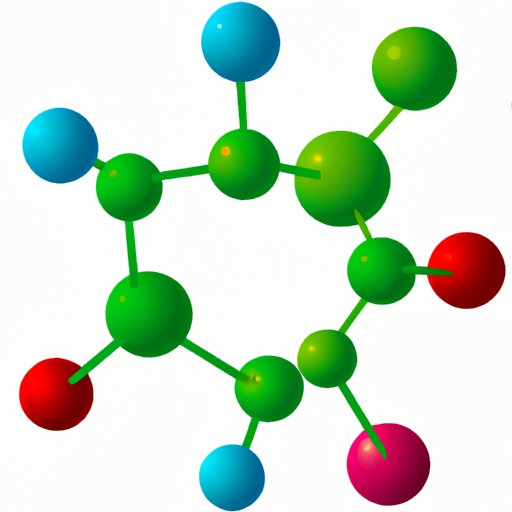Introduction
The word “molecule” is often used in everyday language, but what does it actually mean in science? In this article, we will explore the meaning of molecules in science and delve into the topics of chemistry, biology, and the physical and chemical properties of molecules. We will also discuss how molecules help us understand nature and the impact they have on our lives.

Exploring the Meaning of Molecules in Science
To begin, let’s define what molecules are. A molecule is a group of two or more atoms that are held together by chemical bonds. Molecules can be made up of different types of atoms, such as hydrogen, oxygen, carbon, nitrogen, and more. These atoms interact with each other to form various shapes, sizes, and structures.
Now that we have a basic understanding of molecules, let’s look at their chemical composition. Molecules can be composed of single elements or multiple elements. Single-element molecules are known as homonuclear molecules and consist of only one type of atom. Examples of homonuclear molecules include hydrogen (H2), oxygen (O2), and nitrogen (N2). On the other hand, molecules composed of multiple elements are called heteronuclear molecules, which contain two or more types of atoms. Examples of heteronuclear molecules include water (H2O) and carbon dioxide (CO2).

Understanding the Building Blocks of Life: Molecules
In biology, molecules play an important role in the structure and function of living things. They are the building blocks of life, providing the necessary components for cells, tissues, and organs to perform their functions. Molecules provide the energy, nutrients, and raw materials needed for cells to grow, reproduce, and survive.
Cells use molecules to create proteins, enzymes, hormones, and other substances that are essential for life. These molecules help regulate cell growth, metabolism, and reproduction. They also help generate energy and carry out other vital cellular processes. Without molecules, cells would not be able to perform their necessary tasks.
Molecules also make up the structures of living things. Every living organism is composed of molecules, from the smallest bacteria to the largest mammals. All of these molecules work together to create the complex systems that make up a living organism.
Deconstructing Molecules: The Basics of Chemistry
In addition to biology, molecules are also studied in chemistry. Chemistry is the study of matter and its interactions with other substances. It focuses on the properties of molecules, such as their size, shape, reactivity, and bonding behavior. By studying these properties, chemists can gain insight into the behavior of molecules and how they interact with other substances.
Chemistry involves analyzing and measuring molecules, as well as understanding their bonding and reactivity. By studying these aspects of molecules, chemists can better understand the behavior of different substances and how they interact with each other. Chemical reactions between molecules are essential for many processes, such as photosynthesis, respiration, digestion, and more.

How Molecules Help Us Understand Nature
Molecules also play an important role in helping us understand nature. By studying the physical properties of molecules, scientists can gain insight into the behavior of different substances. For example, scientists can measure the melting point, boiling point, and solubility of molecules in order to learn more about their physical properties.
In addition, scientists can analyze the chemical reactions of molecules to gain a better understanding of how different substances interact with one another. By studying the chemical reactions of molecules, scientists can learn more about the processes that occur in nature, such as photosynthesis, respiration, digestion, and more.
Finally, molecules play an important role in biological processes. By studying the behavior of molecules, scientists can gain insight into the structure and function of living things. For example, scientists can study the structure of proteins, enzymes, and hormones to better understand how they work in cells and other organisms.
Molecules: A Primer for Scientists and Non-Scientists Alike
Molecules are an essential part of science and our everyday lives. By understanding what molecules are and how they interact with other substances, we can gain a better understanding of nature and how it works. Molecules provide the building blocks for all living things and help us understand the physical and chemical properties of different substances.
What can we learn from molecules? We can learn about the structure and function of living things, the physical and chemical properties of different substances, and the chemical reactions that occur in nature. We can also use molecules to create new materials, medicines, and technologies.
How can we use molecules? We can use them to create new materials, medicines, and technologies. We can also use them to better understand the physical and chemical properties of different substances and the biological processes that occur in living things.
What impact do molecules have on our lives? Molecules play an important role in our everyday lives. They provide the building blocks for all living things and help us understand the physical and chemical properties of different substances. They also help us create new materials, medicines, and technologies, as well as gain a better understanding of the biological processes that occur in living things.
Conclusion
In conclusion, molecules are essential for life and have a great impact on our lives. They are the building blocks of life and provide the necessary components for cells, tissues, and organs to perform their functions. They also help us understand the physical and chemical properties of different substances, as well as the biological processes that occur in living things. By understanding what molecules are and how they interact with other substances, we can gain a better understanding of nature and how it works.
(Note: Is this article not meeting your expectations? Do you have knowledge or insights to share? Unlock new opportunities and expand your reach by joining our authors team. Click Registration to join us and share your expertise with our readers.)
